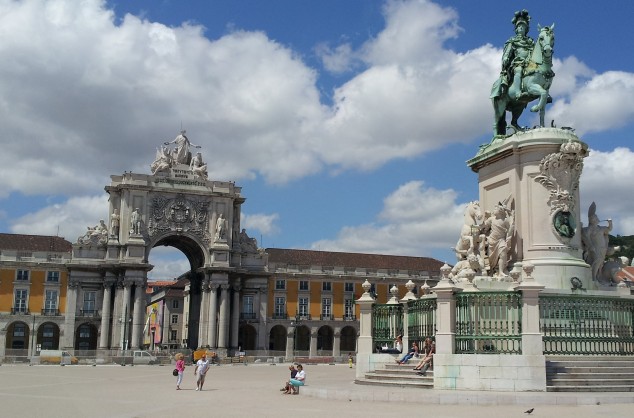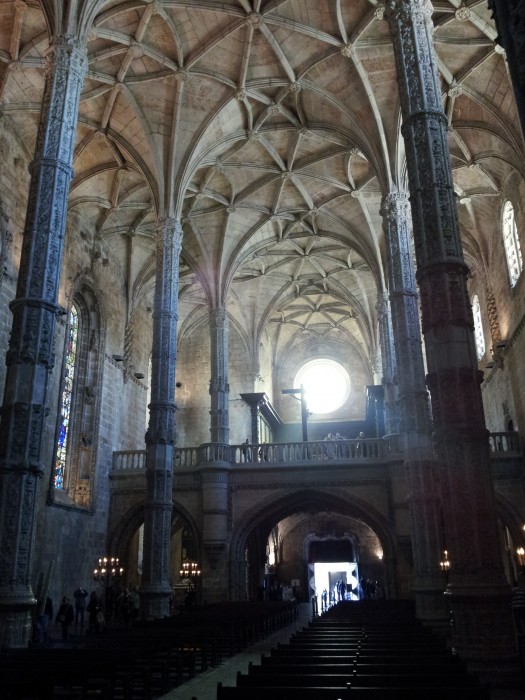Portugal is one of a number of countries that I have wanted to visit for years but somehow haven’t got to yet (some others are Russia and Turkey). I made my first, short but very enjoyable visit to Lisbon last weekend as guest of my good friend and former colleague José. Portugal and the UK have been allies for centuries. The two countries have in common a sea-faring tradition which allowed each of these relatively small nations to grab enormous global empires. They have shared a common interest in opposing the larger continental European land powers – first Spain, then France, which have tried to dominate the smaller countries. In 1807, with Napoleon’s troops approaching the city of Lisbon, the Portuguese royal family and their entourage (some 15,000 people, so in effect the whole government) sailed to the then colony of Brazil under the protection of the British Royal Navy.
Portugal established the first global empire, including the territory that became Brazil, Angola, Mozambique plus various parts of India, Sri Lanka and Indonesia. It was the first European overseas empire and technically the longest lasting, as Macau was only officially returned to China in 1999. All of this was run, for a while, from the Praça do Comércio (Commercial Square) pictured below, a sort of Portuguese Trafalgar Square. This was originally the site of the royal palace, destroyed in the massive earthquake of 1755. It’s a much less crowded place than its British equivalent, perhaps because Portugal doesn’t market its tourism potential as effectively as it could.
The earthquake and accompanying tsunami destroyed most of the city and ended Portugal’s colonial expansion. The rebuilding of Lisbon gave it today’s lovely wide streets and squares. It also led to questioning across Europe of the plausibility of the traditional view of a Christian god who could allow such a catastrophe. The argument, now familiar, is: either God is omnipotent or he is loving. He clearly cannot be both if he permits (causes) natural disasters such as the Lisbon earthquake. The traditional view is satirised in Voltaire’s short book Candide, which introduced a parody of the philosopher and mathematician Leibniz in the form of Dr. Pangloss, who thinks that whatever happens, however terrible, is for the best because we live in the best of all possible worlds.
One of the great classical economists, David Ricardo, used the example of Portugal and Britain to argue the benefits of free trade in his 1817 book “On the Principles of Political Economy and Taxation”. Ricardo, incidentally, was from a family of Portuguese origin and had an exciting but short life which included eloping with a Quaker, thus alienating his Jewish family, becoming a stockbroker, making a fortune speculating on the outcome of the Battle of Waterloo and purchasing the fine country house of Gatcombe Park in Gloucestershire, now the home of Princess Anne. He only started working on economics at the age of 37 but died at just 51, having by then become one of Britain’s leading intellectuals and a major figure in the history of economic thought.
One of few things I recall from history at school is that Portuguese Count Vasco da Gama, “discovered” India in 1498 – well I didn’t actually remember the date. Obviously the Indians see things rather differently. (José reminded me of comedian Eddie Izard’s sketch on how the British created their empire through the use of flags). Da Gama is buried in the beautiful Jerónimos Monastery in Lisbon. Here’s the ceiling.
It was somehow fitting that it was in Portugal that I watched Chelsea beat Bayern Munich on Saturday night. Watching with me were two Portuguese and a German. The German naturally supported Bayern but the Portuguese had no doubts that they wanted Chelsea to win, not just because of the number of Portuguese players in the team, but also because (I think) of the historic connections between Portugal and the UK.




Benito
Wrong, Simon! They did not want the Brits to win but the Germans to loose!!!. A little retaliation as we are all fed-up of the Merkel policies
Simon Taylor
Yes, that’s a very plausible explanation. I imagine southern Europeans everywhere were supporting Chelsea for that reason.
Sanjiv
Simon
Great post. Thanks
You wrote “One of few things I recall from history at school is that Portuguese Count Vasco da Gama, “discovered” India in 1498. ” You are right in putting the discovered in quotation marks.
I grew up in Kenya and Vasco de Gama was very much part of the history curriculum. The last stage of his journey was from Mombasa to Goa. He was accompanied on this stage by an Indian sailor and showed him the route to India. Many Arabs, Indians and other had been sailing up and down the East African coast for centuries.
Anthony Smith
Hello Simon,
Long time no see etc..
I remember going to Lisbon twice to do some sound dubbing sessions. The first time, all the taxis were rather ancient Austin Cambridges. A couple of years later they were all modern Toyotas. Humph.
Great city.
Best,
Anthony.
stuart morle
Surely it’s a case of God being either omnipotent and therefore malicious,in the light of what he allows to happen,or quite simply not there at all.
Retardo
“The earthquake and accompanying tsunami destroyed most of the city and ended Portugal’s colonial expansion.”
Sigh…
You’re joking, right? I strongly advise you to buy some History book about the XIX century colonial race of European countries. Colonial Africa (i mean the entire continent) was a creation of XIX century… including the Portuguese possessions.
Besides, Brazilian territorial limits were still disputed for decades after the earthquake.
“One of few things I recall from history at school is that Portuguese Count Vasco da Gama, “discovered” India ”
Nobody in Portugal says or studies that. Vasco da Gama completed the final stage of the Portuguese project of the last 50 years: discover a SEA ROUTE to India.
Bartolomeu Dias in 1488 did turn Southern Africa for most of it, and Vasco da Gama was well prepared until the Cape of Good Hope: he knew the winds, he knew the streams, he had the maps. And yes, Sanjiv, that’s no mystery, Vasco da Gama was always around experienced sailors, that’s why his journey was a success: a FULL SEA ROUTE was completed, a round trip from Portugal to India – that is the reason Portugal for 30 years benefited from the spices trade.
Everybody in Portugal (and in Europe) knew India exists, of course. You can see the best example of that trade force with the Jeronimos Monastery in Lisbon.
By 1530, the spice trade, though continued for centuries, began its slow decline and Portugal turned to Brazil.
Just because you study things in a rather simple or generalized way, doesn’t mean they study like that in other countries, like Portugal. If your friend Jose or you have study that “Portugal discovered India”, than that is a reflect of a poor History education full of myths than real knowledge.
In Portugal we study the discover of the sea route to India. Nobody can deny that decades-long project was really made.